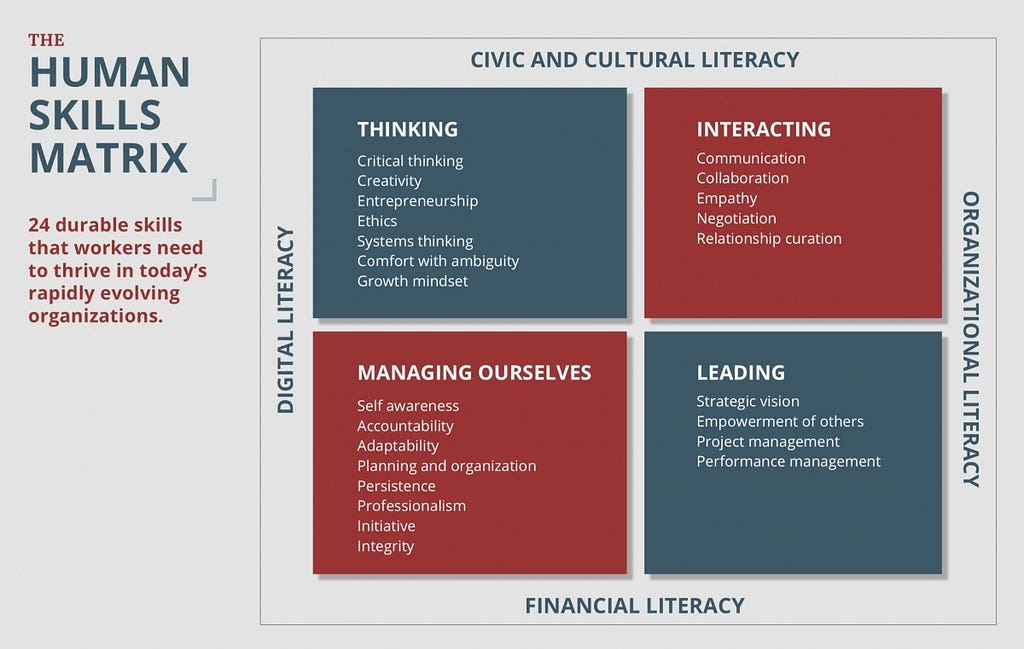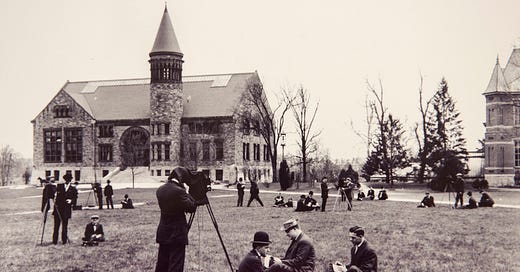This post goes out to both free and paid subscribers, but if you are not already a paid subscriber and value this effort and our growing community, please consider upgrading to a paid membership.
“During the past decade, the study of English and history at the collegiate level has fallen by a full third. Humanities enrollment in the United States has declined over all by seventeen per cent, Townsend [Robert Townsend, the co-director of the American Academy of Arts and Sciences’ Humanities Indicators project] found…And American scholars…have begun to wonder what it might mean to graduate a college generation with less education in the human past than any that has come before.” The New York Times, 2/27/2023
American academics are posing a profound question: What will it mean to our country “to graduate a college generation with less education about the human past than any that has come before”. I think it will mean a lot—more than our political system can withstand, given the lack of a basic understanding of how our government should work by more than a few of our current elected officials and well over a majority of the U.S. population — almost 50% of American adults cannot name the three branches of government and just over half of our population understands that “a 5-4 ruling by the Supreme Court becomes the law of the land.”1
Because I’ve always been interested in history, literature and government studies and aspired to practice environmental law before I entered high school, I have thought a lot about the current high school curriculum’s de-emphasis of required civics classes in favor of math and science. And it turns out, so has the American Federation of Teachers (AFT) which published a report in 2018 on the state of civics’ instruction in America’s public schools. This report showed a wide disparity among state civics requirements, with only nine states and D.C requiring a full year of civics instruction, 30 states requiring a half year instruction and 11 states requiring no civics classes at all. There also is a correlation between required civics classes and civic engagement of the high school age population: “The 10 states with the highest youth volunteer rates have a civics course requirement for graduation and score higher than average on the AP U.S. government exam,” according to findings of the AFT report.
A more recent analysis from CivXNow, an organization founded by the late Supreme Court Justice, Sandra Day O’Connor, provides a 2023, state by state analysis of Civics requirements for K-12. The number of states requiring a full year of civics education is down from nine to seven, and now 13 states, up from 11 in 2016-2018 have no requirements for civics classes.
You can access the interactive map offered by CivXNow and look up your state for its current policies on civics education.
Teaching the structure of our government and the rights and responsibilities that come with a participatory democracy through a civics curriculum, although vital, only lays the foundation for understanding our communities, country and the larger world. The study of history and the humanities in K-12, college and beyond helps us understand the “why” behind the structure.
Unfortunately, in the last several decades there has been a significant decline of students majoring in history, English and the humanities in college, and this likely is directly linked to the emphasis on the STEM curriculum in K-12, and its corresponding de-emphasis of government classes. High school graduates in the last few decades simply don’t have as much interest in government (and the humanities) because they’ve not been presented with the opportunity to become interested through rigorous coursework.
Perhaps as a result, some colleges are eliminating a number of liberal arts majors; for example, Marymount University in Arlington, Virginia announced its tentative decision to eliminate nine liberal arts majors earlier this year, saying “It would be irresponsible to sustain majors and programs with consistently low enrollment, low graduation rates and lack of potential for growth…” and the cuts were intended to “better position the university for long-term growth and success [and] prepare students for highly sought after jobs." But some students and faculty at Marymount disagree. One liberal arts graduate quoted in the article says he “loved his courses” and that they “made an indelible impact on my life… [and] Eliminating those just makes you not equipped for the 21st century.”
And several other colleges are following this trend.
I understand that paying massive amounts for tuition can lead you (and your parents) to want a “practical” degree after an expenditure of tens of thousands of dollars. But what is practical? Employers supposedly want young employees who can solve problems, hopefully in a creative way and in a way different from past generations—that is why old folks with experience are kicked out of jobs and replaced by the young. But how can a recent college graduate be expected to solve problems creatively, or in a new way, without exposure to the larger picture that an exploration of history, literature and humanities provides, an exploration that provides the “why” behind past decisions and the best way to change them? And perhaps even more importantly, an education lasts a lifetime and narrowly focused, job oriented majors only prepare students for jobs relevant to that point in time, not to problem-solve and think for a lifetime.
According to an MIT white paper published last year, employers today are indeed focusing more on “human skills”, like “critical thinking, creativity, communication, collaboration, initiative, integrity, and comfort with ambiguity, [to] complement technical skills and [that] cannot be directly replicated by today’s technology.”
MIT Open Source put together this skill graph to help explain how these learned ways of thinking and specific skills compliment one another.

And what can you and/or your children and grandchildren actually do with a liberal arts major? Well, it’s not inconsistent with the critical business term called return on investment (ROI), and the investment is in you and your thinking process. It also makes you incredibly valuable to potential employers, as is artfully described in a recent article in Moneycrashers that notes several distinct benefits to both you and your financial prospects from earning a liberal arts college degree.
George Anders, author of “You Can Do Anything: The Surprising Power of a ‘Useless’ Liberal Arts Degree,” argues that graduating with a liberal arts degree empowers you to tackle a wide range of employment, and includes evidence to support his idea:
First, the U.S. economy has created at least 626,000 jobs – and perhaps as many as 2.3 million – since 2012 in what I’m broadly calling ‘the rapport sector’ or the ‘empathy economy.'” Building rapport through empathy is something liberal arts majors train in, whether they’re seeking to understand soldiers in ancient Athens or relate to the character of Jay Gatsby. According to the AAC&U study, four out of five employers think students should acquire a broad knowledge of the liberal arts.
___________________________________________________________________________
I’d love to hear what you think about our declining civics curriculum in K-12, and colleges dropping many liberal arts majors to “better position them (the colleges) for the future. Or anything else you take from this post—your comments are welcome and appreciated!
Please consider supporting The Poverty Trap with a free or paid subscription. Your financial support will allow me to continue writing this newsletter and expanding it with primary source statistics and podcast interviews. Thank you in advance for your financial support of my writing!












Share this post